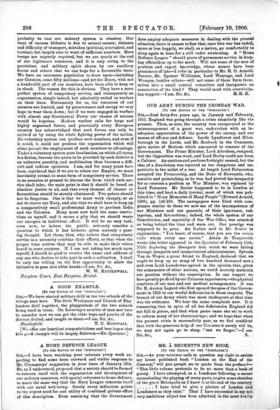UNIVERSAL MILITARY SERVICE.
[To THE EDITOR OF THE "SPECTATOR:]
SIR,—The country will have learnt more than one important lesson before the end of the present campaign. The first will
probably be that our military system is obsolete. Our want of success hitherto is due to several causes; distance and difficulty of transport, mistakes (political, strategical, and tactical), but largely also to want of sufficient numbers. More troops are urgently required, but we are nearly at the end of our legitimate resources, and it is only owing to the patriotism and military spirit shown by our auxiliary forces and others that we can hope for a favourable issue. We have an enormous population to draw upon—including our Colonies, some fifty millions—and yet the Boers, with not a hundredth part of our numbers, have been able to keep us in check. The reason for this is &mime. They have a most perfect system of compulsory service, and consequently an organisation, simple indeed, but admirably suited to warfare on their lines. Fortunately for us, the resources of our enemies are limited, and by perseverance and energy we may hope to wear them down ; but if we were engaged in warfare with almost any Continental Power our chance of success would be hopeless. Modern warfare calls for large and highly organised forces, and practically every European country has acknowledged that such forces can only be arrived at by using the whole fighting power of the nation. No voluntary system can produce such numbers, and even if it could, it could not produce the organisation which will alone permit the employment of such numbers to advantage. Under a voluntary system pure localisation, on which all turns, is a fiction, because the quota to be provided by each district is an unknown quantity, and mobilisation thus becomes a diffi- cult and tedious operation. I am, and for many years have been, convinced that if we are to retain our Empire, we must inevitably submit to some form of compulsory service. There is no occasion at present to discuss the form which such ser- vice shall take; the main point is that it should be based on absolute justice to all, and that every element of chance or favouritism should be sternly eliminated. Two points should not be forgotten. One is that we must work cheaply, so as not to starve our Navy, and also that we shall have to keep up a comparatively small professional Army to garrison India and the Colonies. Many must now hold the same convic- tions as myself, and it seems a pity that we should waste our energies in individual effort. It will be no easy task, even now, to induce the public seriously consider a question to which it has hitherto given scarcely a pass- ing thought. Let those, then, who believe that compulsory service is a necessity combine their efforts, so that when the proper time arrives they may be able to make their voices heard to some purpose. If I am not taking too much upon myself, I should be glad to receive the name and address of any one who desires to take part in such combination. I shall be only too willing on the first opportunity to allow the initiative to pass into abler hands.—I am, Sir. &c., W. W. KETTLEWELL.
Harptree Court, East Harptree, Bristol.



































 Previous page
Previous page